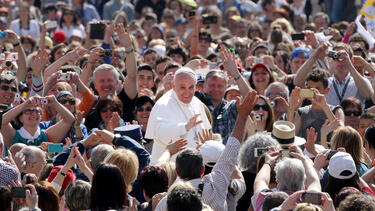The Lessons from Pope Francis for the Class of 2025
Yale SOM leadership expert Jeffrey Sonnenfeld reflects on what the next generation of leaders can learn from the late pope.

Pope Francis in St. Peter’s Square in 2013.
This commentary was adapted from a commencement address delivered at Sacred Heart University and originally published in the Hartford Courant. The views expressed are the authors’ own.
A few days ago, the College of Cardinals convened to select a successor to the beloved Pope Francis—a very challenging reign for any human to follow. It would be presumptuous for me to suggest the leadership qualities needed for this daunting role, but I think there are lessons in the life and work of Pope Francis—confirmed by the research we have done at the Chief Executive Leadership Institute—not just for Pope Leo XIV but for all of us, and especially the graduates starting down their own paths as leaders this month.
Personal dynamism. Like Pope Francis, you must be accessible to your constituents and not sitting on thrones—hiding behind walls, guards, and fancy desks. In 12 years, he visited 68 countries. In just 11 days last year, he traveled 20,000 miles in Southeast Asia. Even while at death’s door, he rode in the streets to greet crowds on Easter.
Empathy. Like Pope Francis, you must show concern for the well-being of all your constituents, whether rich or poor, weak or powerful, sick or healthy. In March 2024, from a wheelchair, Pope Francis washed the feet of 12 women inmates at the Rebibbia prison in Rome as part of the Holy Thursday ritual—a traditional gesture that symbolizes service and humility.
Authenticity. You must act consistently with your pronouncements. Pope Francis lived as humbly as he preached. He asked to be buried in the Basilica di Santa Maria Maggiore outside Vatican City and not in St. Peter’s Basilica.
Stretch Goals. Pope Francis always challenged the status quo—willing to name specific countries while advocating for acceptance of diverse lifestyles, encouraging open political debates, addressing issues like migration and climate change, criticizing trickle-down economics, and championing the well-being of the poor—all while advancing the call for peace.
Courage. Pope Francis met with Iraq’s top Shiite cleric, Ayatollah Al-Sistani, to advance interfaith understanding. He increased the representation of cardinals from Asia, Africa, and Latin America. He was the first pope in from the Americas and the first non-European in over a 1,000 years.
So often in business schools we teach the importance of high performing groups, self-directed work teams, empowered employees, and—lately—destroying bureaucracy. Sometimes we have too much groupiness—driving out mavericks and entrepreneurs who build and change society.
But bosses still matter, as individuals still matter. CEOs hide behind cowardly trade groups; many universities boards muzzle college president with the cover of enforce “institutional neutrality.” Trade union leaders are fearful of their members. Professional associations are afraid to engage. Community activists are too often divided over narrow parochial grievances.
When in 1854, French legislator Alexis de Tocqueville came to study what made American democracy work he learned it was not the tightness of the laws but their looseness. They allowed flexibility for bold patriotic leaders to stand up to certify truth and declare justice. He called this kind of trust-building “social capital”—a resource created by leaders and as important as financial capital.
Strong leaders are needed to bring people together. In almost any city or village, the town squares and parks have magnificent statues—not to celebrate teams, audit committees, or task forces, but instead showcase bold-thinking individual leaders. Pope Francis gave us such a timely and inspiring—if daunting—model of how to use our new degrees to lead in meaningful ways.
In short, society urgently needs leaders with more empathy and authenticity.